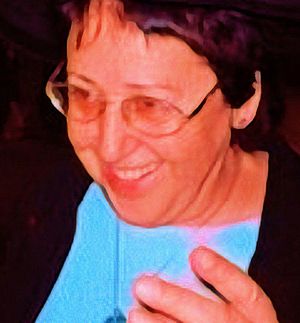Mari Jose Urruzola facts for kids
Quick facts for kids
Mari Jose Urruzola
|
|
|---|---|

(2005)
|
|
| Born |
Mari Jose Urruzola Zabalza
23 May 1940 Irun, Spain
|
| Died | 28 April 2006 Bilbao, Spain
|
| Occupation |
|
| Known for | coeducation and education for equality movements |
| Awards | Premio Emakunde a la Igualdad |
Mari Jose Urruzola Zabalza (born in Irun, Spain, on May 23, 1940 – died in Bilbao, Spain, on April 28, 2006) was an important Spanish educator, a supporter of women's rights (a feminist), and a writer. She is known for her work on coeducation (boys and girls learning together) and for promoting equality in education.
Contents
Early Life and Learning
Mari Jose Urruzola grew up in different cities in Spain, including Donostia and Madrid. She worked hard to pay for her university studies in Madrid. She earned a degree in philosophy and later taught this subject during her career. She also studied coeducation at the University of Barcelona.
Her Work and Ideas
Mari Jose Urruzola was very dedicated to coeducation and feminism throughout her life. Starting in the 1970s, she joined groups of women teachers and educators. These groups were part of the wider feminist movement. They wanted to find ways to use feminist ideas in schools, which led to the concept of coeducation.
From 1985 onwards, more groups and organizations started to support coeducation. They also began to use language that did not favor one gender over another in their books. Urruzola believed that education should help people grow and improve. As a teacher, she shared her ideas about teaching in a way that promoted equality and avoided stereotypes. Coeducation was a key part of her approach.
She wrote many books and guides for girls and teenagers. These books covered important topics like preventing violence, building healthy relationships, and sex education.
What is Coeducation?
For Urruzola, making coeducation work meant looking at mistakes and finding new ways to teach. She wanted to move from traditional mixed schools to true coeducation. She believed that a new way of educating should take the best parts of both "feminine culture" and "masculine culture." She also wanted to create a "new idea of a person." This meant teaching each boy and girl as an individual, respecting their "differences." This approach helped students avoid harmful stereotypes that limit their growth.
Mari Jose Urruzola once said that schools should be places where people learn "things that teach them to be people." She believed this would help each person choose how they want to contribute to society. She saw this as the school's role in building a better society.
Teaching and Advising
Urruzola taught philosophy and ethics in schools in Bilbao for over 25 years. In the 1990s, she worked as a coeducation adviser for the Department of Education of the Basque Government. She retired from this role in 2001.
She also helped start and lead several feminist groups. She founded the "Colectivo Feminista Lanbroa" (Lanbroa Feminist Collective) and was its president. She also co-founded the "Emilia Pardo Bazán" and "Emaitza" feminist associations. She helped create the Confederation of Feminist Organizations. She was also involved in politics, running in the 1999 European Parliament election. In 2000, she helped start the Euskadi Feminist Party.
Awards and Recognition
Mari Jose Urruzola received several honors for her important work:
- In 2006, after her death, she was given the Premio Emakunde a la Igualdad (Emakunde Award for Equality).
- Also in 2006, the Coeducation Seminars held a special event to honor her.
- In 2008, the Bilbao City Council, the Lanbroa Feminist Collective, and the Feminist Party of Spain paid tribute to her.
Selected Books
Here are some of the books Mari Jose Urruzola wrote:
- Aprendiendo a amar desde el aula (Learning to Love from the Classroom), 1991
- Guía para chicas. Cómo andar por casa (Guide for Girls. How to Get Around at Home), 1992
- Guía para chicas. Cómo prevenir y defenderte de las agresiones (Guide for Girls. How to Prevent and Defend Yourself from Attacks), 1992
- Introducción a la filosofía coeducadora (Introduction to Coeducational Philosophy), 1995
- Violencia de género: el maltrato escondido: guía para identificar y superar las causas de la violencia cotidiana (Gender Violence: Hidden Abuse: Guide to Identify and Overcome the Causes of Daily Violence), 2001
- Igualdad y responsabilidad en la edad de la sabiduría: vivir y envejecer con protagonismo y autoridad personal (Equality and Responsibility in the Age of Wisdom: Living and Aging with Personal Leadership and Authority), 2003
- Vivir la separación como una oportunidad para aprender: guía para la corresponsabilidad en la reconstrucción emocional (Living Separation as an Opportunity to Learn: Guide for Co-responsibility in Emotional Reconstruction), 2003
Collaborations in Other Books
She also contributed to these collective works:
- Coeducar para el desarrollo físico (Coeducating for Physical Development), 1993
- Ser chica en una escuela de chicos (Being a Girl in a Boys' School), 1993
- La coeducación una alternativa transversal a la escuela actual (Coeducation: A Cross-Cutting Alternative to Today's School), 1995
- Educar en la igualdad, un camino hacia la prevención de la violencia (Educating in Equality, a Path Towards Preventing Violence), 2000
See also
 In Spanish: Mari Jose Urruzola para niños
In Spanish: Mari Jose Urruzola para niños
 | Charles R. Drew |
 | Benjamin Banneker |
 | Jane C. Wright |
 | Roger Arliner Young |

